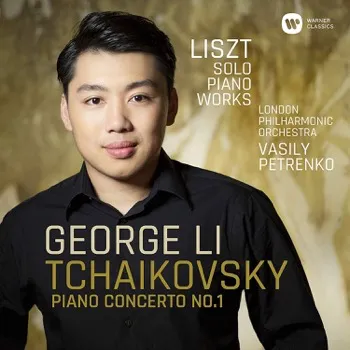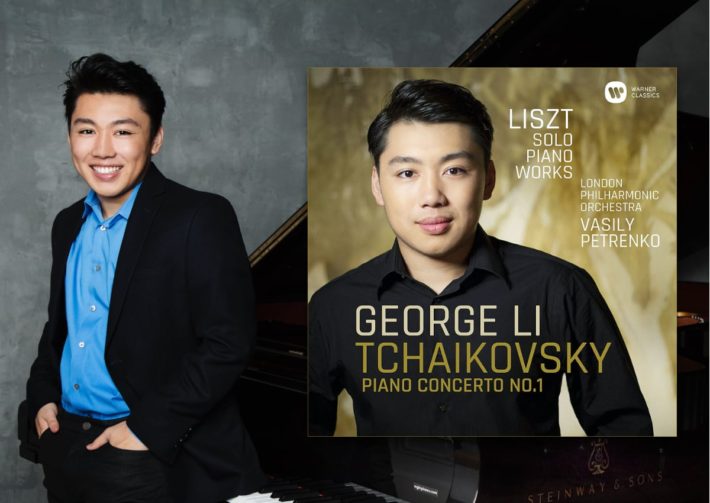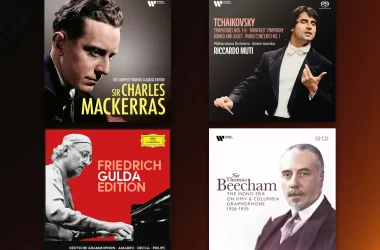In a new Warner Classics release, George Li collaborates with Vasily Petrenko and the London Philharmonic Orchestra to present Tchaikovsky’s Piano Concerto No. 1 along with solo selections by Liszt. Li, silver medalist of the XV International Tchaikovsky Competition, shows impressive technical prowess and musical sensitivity that brings new ideas to this often performed piece.

Li generally puts forth a commendable interpretation of the B Flat Minor Concerto. One performance pitfall is that without the right amount of musicality, This piece can end up sounding overly virtuosic. The pianist avoids this with a warm and rich sound quality that complements Tchaikovsky’s expressive lines and dense pianistic texture. However, Li does have an occasional inclination to blur the line between espressivo, rubato, and ritardando. In the first movement (1’04”), he uses excessive rubato which causes his downbeats to fall behind those of the orchestral pizzicatos. While this might be overlooked in one instance, it happens often enough to make the listener perceive a lack of synchronicity. Other pianists, such as Argerich with Abbado (DG) or Rana with Pappano (Warner, 2015) manage to convey musicality and expressiveness without excessive fluctuations in tempi.
Overall, the conversation between pianist and orchestra is smooth and well-executed. There are a few stylistic inconsistencies between Li and the orchestra, however. The first occurs at the Allegro con spirito (4’48” onwards). The score indicates a two-note pattern written as a triplet where the last note is replaced by a rest. While Li observes the precision of this pattern, the orchestra (particularly the flutes) do not. The latter’s notes sound so clipped and close together that the listener could perceive them more as acciaccaturas. In other instance (5’33”), Li’s sixteenth notes sound too pedalled and muddy, especially through his short crescendos. He also over-lengthens the left-hand notes just by a hair, making the line too legato. The texture that Li creates is at odds with the pizzicatos in the strings. In contrast, Beatrice Rana’s sixteenths are much drier and shorter, aligned with the sparse orchestral accompaniment; Argerich’s left-hand notes are closer in length to those in the right hand, making for a crisp and even sound. in the second movement, the somewhat segmented flute solo’s phrasing does not mirror Li’s beautiful tenuto and cantabile.
Looking closely at the score, the main theme of the third movement Scherzo is indicated as Allegro con fuoco. Li takes this a little too literally with thumped accents on the left-hand downbeats, where there is no indication to do so (Tchaikovsky marks the downbeat with just a staccato). Coupled with a brisk tempo, the piano line has a forced feel. Kozhuhkin and Sinaisky’s 2016 recording is considerably slower but incorporates the con fuoco indication, and his avoidance of unnecessary accents prevents a wooden sound. Argerich takes a similarly fast tempo but also barely accents, making allows for the line to come across with more vitality. Li’s Scherzo, despite the aforementioned aspects, is his best movement. The thunderous octaves à la Horowitz starting at 5’09” effectively set up the Molto meno mosso. The dialogue between soloist and orchestra is executed seamlessly up to a strong conclusion.
Li’s Liszt recordings are impressive. Of note are his two selections from Années de pèlerinage. Les jeux d’eaux à la Villa d’Este shows scintillating clarity with just the right amount of virtuosity; it could perhaps use a little more delicacy in the opening along the lines Cziffra (1977). The Sonetto 104 del Petrarca combines both of Li’s technical ability and mature musicality, and is a fitting interpretation of the passionate sonnet upon which it is based. The richness of his bass notes throughout adds to this effect and makes the piece sound expansive.
The Concerto was recorded live at London’s Royal Festival Hall. The sound engineering is well executed, capturing the depth and brilliance of Li’s playing and the fullness of the orchestra, all while establishing a well-calibrated balance. The same applies to the solo works, expertly recorded at Boston’s Fraser Performance Studio, WGWH.
Tchaikovsky – Piano Concerto No. 1
Liszt – Les Jeux d’eaux à la Villa d’Este S163/4, Sonetto 104 [Rima CXXXIV] del Petrarca S161/5, Réminiscences de Don Juan S418
George Li – Piano
London Philharmonic orchestra
Vasily Petrenko – Conductor
Warner Classics, CD 9029537957




















